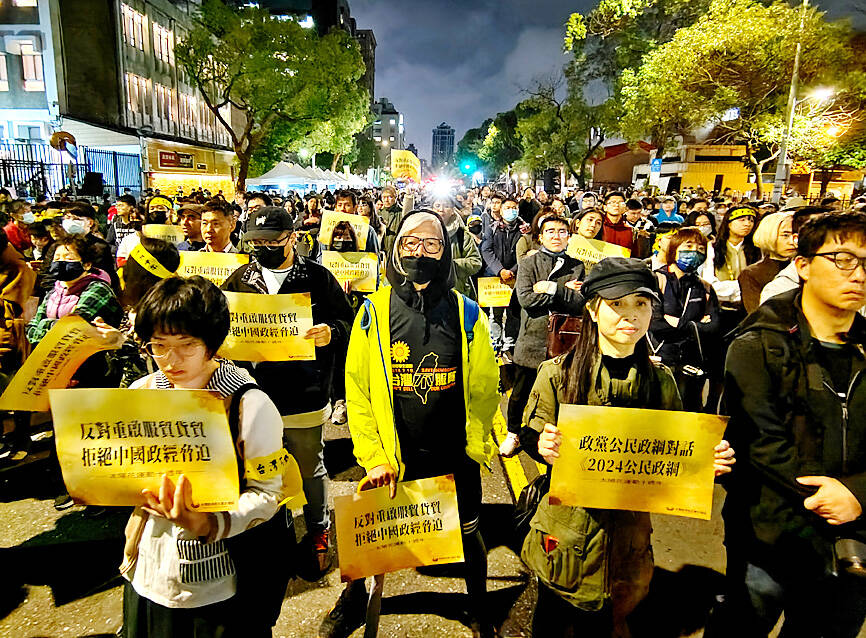Approval of a proposed cross-strait services trade agreement with China would have affected about 1.14 million service-sector enterprises, as well as the jobs and livelihoods of more than 5 million workers in Taiwan, rights advocates said yesterday as they marked the 10th anniversary of the Sunflower movement.
Taiwan Economic Democracy Union, in cooperation with other organizations, held a daylong series of lectures in Taipei to commemorate March 18, 2014, when students and rights campaigners occupied the legislative chamber to oppose the then-Chinese Nationalist Party (KMT) government’s plan to force the passage of the proposed service trade deal through the legislature.
It was the administration of then-president Ma Ying-jeou (馬英九) that agreed to the service trade pact, National Taiwan University professor of economics Jang Show-ling (鄭秀玲) said at one of the seminars.

Photo: Wang Yi-sung, Taipei Times
“The process was not transparent, the terms of agreement were unequal and unfair to us, and they risked undermining Taiwan’s national security,” she said. “Even then-legislative speaker Wang Jin-pyng (王金平) was not aware of it.”
“It was the Sunflower movement that blocked the trade pact from going ahead. Now in retrospect, we must be thankful as it safeguarded Taiwan,” she said.
“It would have impacted all service-oriented sectors and companies in Taiwan, affecting many people’s livelihood. It is an unequal trade pact,” she said. “The deal would have the Taiwanese government collaborate with Beijing in line with China’s 12th Five-Year Plan, which it adopted in 2011.”
Under Beijing’s plans, the service trade deal aimed to incorporate Taiwan into its new economic zone “for Chinese cities on the western shores of the Taiwan Strait” and upgrade the competitiveness of China’s service sector, as listed under its Five-Year Plan, she said.
“The trade pact would have opened up Taiwan’s airports, transportation hubs and shipping ports to Chinese businesses, which would have been a national security concern,” Jang said.
“If our legislature had approved it, it would have affected about 5.83 million employees in Taiwan’s service sector,” she said, urging the public to use their vote during elections to rebuke political parties that are planning to revive the service trade deal.
The Democratic Progressive Party released a statement commemorating the Sunflower movement, saying: “Ten years ago, the younger generation learned the importance of safeguarding democracy and freedom, of joining hands with fellow citizens to choose the nation’s path.”
“They understood the great dangers in offering Taiwan’s economic development and political system to China for its taking,” it said.
“The younger generation took action to deepen Taiwan’s democracy, consolidate our economic self-sufficiency and to make friends with all countries around the world, working together with countries that share our ideals about democracy and freedom,” it said.

INVESTIGATION: The case is the latest instance of a DPP figure being implicated in an espionage network accused of allegedly leaking information to Chinese intelligence Democratic Progressive Party (DPP) member Ho Jen-chieh (何仁傑) was detained and held incommunicado yesterday on suspicion of spying for China during his tenure as assistant to then-minister of foreign affairs Joseph Wu (吳釗燮). The Taipei District Prosecutors’ Office said Ho was implicated during its investigation into alleged spying activities by former Presidential Office consultant Wu Shang-yu (吳尚雨). Prosecutors said there is reason to believe Ho breached the National Security Act (國家安全法) by leaking classified Ministry of Foreign Affairs information to Chinese intelligence. Following interrogation, prosecutors petitioned the Taipei District Court to detain Ho, citing concerns over potential collusion or tampering of evidence. The

Seventy percent of middle and elementary schools now conduct English classes entirely in English, the Ministry of Education said, as it encourages schools nationwide to adopt this practice Minister of Education (MOE) Cheng Ying-yao (鄭英耀) is scheduled to present a report on the government’s bilingual education policy to the Legislative Yuan’s Education and Culture Committee today. The report would outline strategies aimed at expanding access to education, reducing regional disparities and improving talent cultivation. Implementation of bilingual education policies has varied across local governments, occasionally drawing public criticism. For example, some schools have required teachers of non-English subjects to pass English proficiency

NEGOTIATIONS: The US response to the countermeasures and plans Taiwan presented has been positive, including boosting procurement and investment, the president said Taiwan is included in the first group for trade negotiations with the US, President William Lai (賴清德) said yesterday, as he seeks to shield Taiwanese exporters from a 32 percent tariff. In Washington, US Trade Representative Jamieson Greer said in an interview on Fox News on Thursday that he would speak to his Taiwanese and Israeli counterparts yesterday about tariffs after holding a long discussion with the Vietnamese earlier. US President Donald Trump on Wednesday postponed punishing levies on multiple trade partners, including Taiwan, for three months after trillions of US dollars were wiped off global markets. He has maintained a 10 percent

TRADE: The premier pledged safeguards on ‘Made in Taiwan’ labeling, anti-dumping measures and stricter export controls to strengthen its position in trade talks Products labeled “made in Taiwan” must be genuinely made in Taiwan, Premier Cho Jung-tai (卓榮泰) said yesterday, vowing to enforce strict safeguards against “origin laundering” and initiate anti-dumping investigations to prevent China dumping its products in Taiwan. Cho made the remarks in a discussion session with representatives from industries in Kaohsiung. In response to the US government’s recent announcement of “reciprocal” tariffs on its trading partners, President William Lai (賴清德) and Cho last week began a series of consultations with industry leaders nationwide to gather feedback and address concerns. Taiwanese and US officials held a videoconference on Friday evening to discuss the